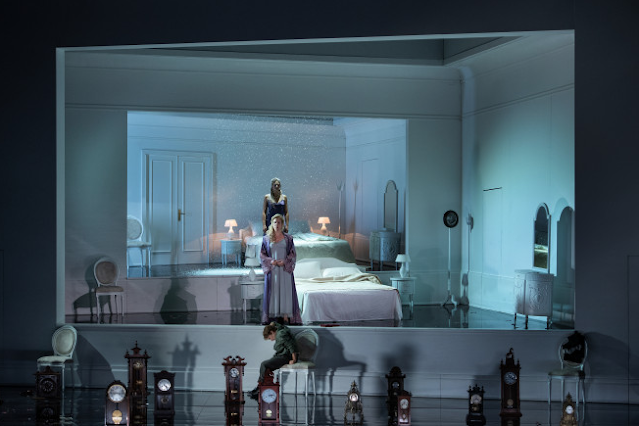Strauss - Der Rosenkavalier
La Monnaie, Brussels, Sunday October 30 2022
Conductor: Alain Altinoglu. Production: Damiano Michieletto. Sets: Paolo Fantin. Costumes: Agostino Cavalca. Lighting: Alessandro Carletti. Die Feldmarschallin Fürstin Werdenberg: Julia Kleiter. Der Baron Ochs auf Lerchenau: Martin Winkler. Octavian: Julie Boulianne. Herr von Faninal: Dietrich Henschel. Sophie: Liv Redpath. Jungfer Marianne Leitmetzerin: Sabine Hogrefe. Valzacchi: Yves Saelens. Annina: Carole Wilson. Ein Polizeikommissar/Ein Notar: Alexander Vassiliev. Der Haushofmeister bei der Feldmarschallin/Der Haushofmeister bei Faninal: Maxime Melnik. Wirt: Denzil Delaere. Ein Sänger: Juan Francisco Gatell. Drei adelige Waisen: Annelies Kerstens, Marta Beretta, Marie Virot. Eine Modistin: Lisa Willems. Ein Tierhändler: Alain-Pierre Wingelinckx. La Monnaie Orchestra, Chorus, Choral Academy and Children's Chorus.
 |
| All photos: Matthias Baus/La Monnaie |
My post on Paris's Salome was way too long so, paradoxical though it may be, I'm going to try to keep this one shorter.
La Monnaie's new Rosenkavalier has a typical Brussels cast* mixing new or newish faces with more experienced singers, well-rehearsed and forming a cohesive team. Julie Boulianne portrays a convincingly boyish Octavian, more mezzo than soprano, suitably 'masculine' in timbre. I was told Julia Kleiter was already a 'stunning' Mozartian, and as, at La Monnaie, singers don't need to be equipped with foghorns, she's an excellent 'smaller-scale' Marschallin (a prise de rôle in Brussels), genuinely moving in her wistful monologues. I was especially interested to hear Liv Redpath's Sophie, as, again, I'd heard from a reliable source that she'd been a very good Lucia in LA (not that I care much for Lucia), and been told she was now in great demand for high soprano parts, and that the top was in fact her 'comfort zone.' Some unsteadiness in the lower and middle ranges (it was this cast's first outing, and at a Sunday matinee, not necessarily ideal for all singers) soon settled, and her top notes were indeed, to my ear, gorgeous from the outset, with a welcome fullness and a golden, solar glow (my neighbour found them 'a bit hard'). So the final trio (this time, unlike some others, I managed to stay to the end) worked its magic.
Martin Winkler, the extraordinary star of Covent Garden's The Nose, here with an exaggerated paunch, dressed sometimes as a country squire and, for his visit to Faninal's house, like W. C. Fields in tails and spats, was an excellent, entertaining Ochs, brighter, clearer in timbre than some. As Faninal, Dietrich Henschel continues to make up in experience and his eternal elegance for any wear and tear his voice may now show signs of.
Some of the supporting cast are a good deal less successful, so, as I'm trying to be brief, I won't go into details: the less said, the better, in some cases. I will, however, single out Juan Francisco Gatell as an unexpectedly good 'Italian' singer (in quotes as, if his name's anything to go by, he's from farther west), someone I'd already singled out twice in the same house as Ferrando, the last time being in the Mozart/da Ponte trilogy curtailed by Covid in 2020.
Though it's easy enough on the eye, Damiano Michieletto tends, as usual, to overstate the obvious in his production (already staged in Vilnius), making it sometimes distracting without adding a great deal to what's already familiar from the libretto and score. It takes its cues from the Marschallin's line 'Ja… such' dir den Schnee vom vergangenen Jahr !' The set is all white, with a series of white stages-within-the-stage receding to the rear, and at the front, a scattering of white-framed Louis XVI chairs and settees, recalling Dior on the avenue Montaigne, and an assortment of antique timepieces during the 'stopping-the-clocks' monologue. (With its cool white spaces and multiple beds, it's actually reminiscent of Carsen.)
The multiple spaces house the Marschallin's bedroom at various stages in her life, sometimes filled with snow, and the action takes us back or forth in a series of biographical vignettes, played by doubles. Instead of an animal vendor, we see her mother giving her monkey, parrot and lapdog toys. The Italian singer is the bent, bemedalled elderly Fieldmarshal himself, serenading her in her wheelchair. At one stage she's preparing for her own wedding, trying on the dress; at another, we witness the princely couple's first quarrel, with pearls torn from the Marschallin's throat and flying across the stage; we see her husband come home, undress and sleep, indifferent to his wife (Dove sono i bei momenti?) and, most distracting of all, he does it again as Sophie and Octavian sing the closing duet. The production is bookended by Mohammed, here - riskily replacing one potentially contentious issue with another - a dwarf in white tails, holding a glass snowball.
If the dramaturge working with Michieletto explained in the programme notes why there was an added layer of surrealism, I missed it: a life-sized (but not real) cow and milkmaids for Ochs to ogle, for example, and a giant crow in the bedroom (the spooks in the inn were crows dangling on strings and crows' heads brandished by a row of children: it was a litle bit too orderly), and all that indoor snow. The significance of a bunch of giant white balloons handed from character to character as they sang remained mysterious to me.
But somehow all this was less annoying than the profusion of symbols and hammering-home of ideas in the same director's recent Giulio Cesare in Paris, and musically the show was a success. Alain Altinoglu has, as I've said before, has done an amazing job with La Monnaie's orchestra, and it's no wonder if other houses are lurking in the wings, hoping to snatch him from Brussels. If, in the event, Paris wins (it's been rumoured Dudamel doesn't intend to stay long), so much the better for the ONP.
The brief clip below features the other cast:
*In fact it has two casts and I saw the second.





Comments
Post a Comment